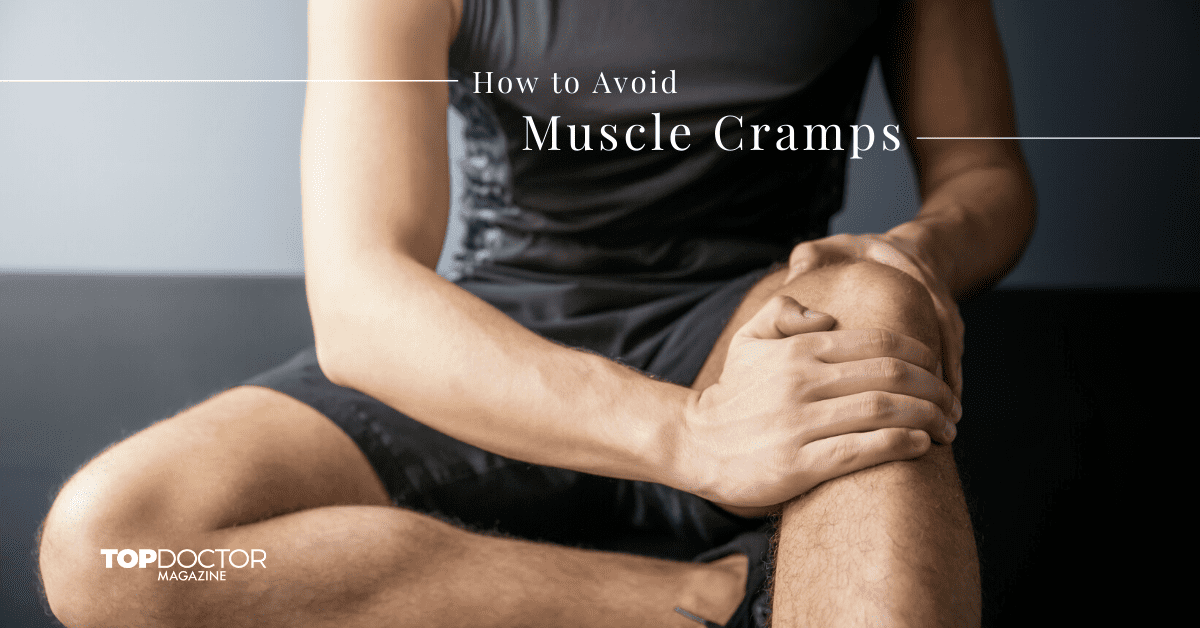We all are more familiar with muscle cramps than we would like. Whether it’s after a hard workout, in the middle of an exercise or game or, everyone’s personal favorite, in the middle of the night, muscle cramps are an unfortunate reality we all have to live with.
However, that doesn’t mean we can’t do things to make muscle cramps less painful or experience them less frequently. There are many strategies and exercises we can employ to relieve and avoid muscle cramps!
What are Muscle Cramps?
A muscle cramp is a simple sudden involuntary contraction of one muscle at a time or more. You’ve likely experienced it before when one of your muscles suddenly felt tight and painful. This sensation usually passes away as the muscle eventually releases, but while the muscle is cramping, it can be incredibly difficult, if not impossible, to use it properly.
Once the cramp releases, however, the muscle returns to normal, although it may be a little sore. Since cramps are usually temporary and don’t inflict permanent damage, most cramps can simply be treated with home remedies.
Where Do Muscle Cramps Come From?
Muscle cramps occur because of the wiring of the muscle fibers. Muscle fibers are filled with very sensitive motor nerves, which fire to move the muscle fibers and cause muscles to contract.
During a cramp, however, these motor nerves suddenly fire without your brain telling them to, causing the muscles to contract much more strongly than expected.
Despite the knowledge that muscle cramps result from sudden motor nerve firing, exact muscle cramp causes are unknown, although research has unearthed certain muscle risk factors.
Mineral Deficiencies
Lacking a sufficient amount of some minerals vital to the muscles can contribute to making muscle cramps more frequent. Specifically, a lack of potassium, calcium and magnesium or the usage of diuretics (i.e., a type of medication used for high blood pressure) can make your muscle cramps happen more often.
Poor Hydration
Poor hydration and a lack of electrolytes can also contribute to muscle cramps, particularly from exercise. This is particularly true when athletes exercise in hot weather, as the body rapidly loses hydration due to the strain of exercise in high heat.
Age and Pregnancy
Lastly, both age and pregnancy can contribute to the frequency of muscle cramps. As people get older, so do their muscles, which lose their size and strength and become more prone to cramping. As we age, night cramps become more common, as well.
Pregnancy can also increase the frequency of cramps as the body takes on additional strain, and muscles are required to carry more weight.
How to Stop Muscle Cramps
Here’s how to relieve a muscle cramp after the gym: stretch and hydrate. It may sound simple, but the best way to stop cramps is to stretch the affected muscle and hydrate, either with water or a sports drink, to replenish any lost electrolytes. At the moment, there isn’t anything else that you can do to alleviate a muscle cramp. Instead, the best way to avoid muscle cramps is prevention.
How to Avoid Muscle Cramps
How to Avoid Muscle Cramps after Exercise or Running
Avoiding muscle cramps after exercise is done by stretching before and after every workout. Also, make sure you drink plenty of water and replace the sodium your body sweats out during exercise.
How to Avoid Muscle Cramps during Pregnancy
Much of the above advice for cramps stays the same during pregnancy: drink plenty of water and stretch your muscles regularly, especially the leg muscles. Stay active and maintain magnesium and calcium levels through supplements if necessary.
Foods That Help Prevent Muscle Cramps
Diet can also contribute to keeping cramps down. We’ve already seen how important it is to drink plenty of water. In addition to that, make sure to focus on foods that boost the minerals that help with cramps. Focus on including more bananas, sweet potatoes, avocados, beans, watermelon and milk for their potassium, calcium and magnesium.
When Should I Be Worried about Muscle Cramps?
You’ve implemented all of these remedies and still ask yourself: Why do my muscles keep cramping? It might be time to talk to your doctor about your cramps. Muscle cramps don’t often require medical attention, but if you find that muscle cramps are happening very frequently or are joined by reduced muscle size, pain or weakness, then you should talk to your doctor. These problems could be a simple hormone or electrolyte imbalance but could point to a neurological issue.
A Parting Reminder
Muscle cramps aren’t fun for anyone, but with certain preventative strategies and plenty of hydration and stretching, they shouldn’t be a big deal. However, if you do see some of the warning signs, it never hurts to seek advice from your doctor.






0 Comments